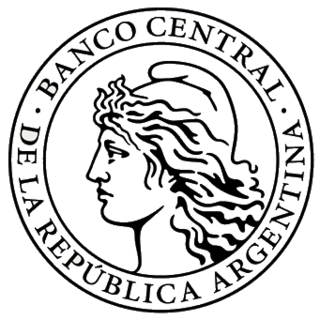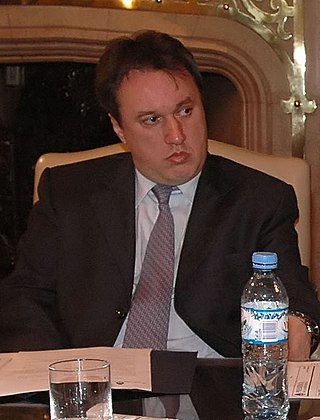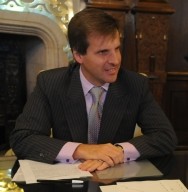
The economic history of Argentina is one of the most studied,owing to the "Argentine paradox". As a country,it had achieved advanced development in the early 20th century but experienced a reversal,which inspired an enormous wealth of literature and diverse analysis on the causes of this decline. Since independence from Spain in 1816,the country has defaulted on its debt nine times;inflation has often risen to the double digits,even as high as 5000%,resulting in several large currency devaluations.

Domingo Felipe Cavallo is an Argentine economist and politician. Between 1991 and 1996,he was the Minister of Economy during Carlos Menem's presidency. He is known for implementing the convertibility plan,which established a pseudo-currency board with the United States dollar and allowed the dollar to be used for legal contracts. This brought the inflation rate down from over 1,300% in 1990 to less than 20% in 1992 and nearly to zero during the rest of the 1990s. He implemented pro-market reforms which included privatizations of state enterprises. Productivity per hour worked during his five-years as minister of Menem increased by more than 100%. In 2001,he was the economy minister for nine months during the 1998–2002 Argentine great depression. During a bank run,he implemented a restriction on cash withdrawing,known as corralito. This was followed by the December 2001 riots in Argentina and the fall of Fernando de la Rúa as president.

Steve H. Hanke is an American economist and professor of applied economics at the Johns Hopkins University in Baltimore,Maryland. He is also a senior fellow at the Independent Institute in Oakland,California,and co-director of the Johns Hopkins University's Institute for Applied Economics,Global Health,and the Study of Business Enterprise in Baltimore,Maryland.

The Buenos Aires Stock Exchange is the organization responsible for the operation of Argentina's primary stock exchange located at Buenos Aires central business district. Founded in 1854,it is the successor to the Banco Mercantil,which was created in 1822 by Bernardino Rivadavia.

The Central Bank of the Argentine Republic is the central bank of Argentina,being an autarchic entity.

Héctor Manuel Valdez Albizu is the current Governor of the Central Bank of the Dominican Republic,a position he first held from 31 August 1994 through 16 August 2000,and again since 17 August 2004. He is also a well known economist and author of numerous works relating to economics.

JoséLuis Machinea is an Argentine economist and United Nations official. He was Minister of Economy and President of the Central Bank.
Adolfo César Diz was an Argentine economist who was President of the Central Bank of Argentina from 1976 until 1981.

Miguel Gustavo Peirano is an Argentine economist and former Minister of Economy and Production of Argentina. He was appointed by President Néstor Kirchner on July 17,2007,in place of Felisa Miceli.
Miguel Alberto Kiguel holds a degree in Economics from the University of Buenos Aires (1976) and a Ph. D. from Columbia University (1983). He is currently Director of EconViews,an economic and financial advisor to major corporations and financial institutions in Argentina and abroad,a consultant with Latin American Governments,and multilateral institutions,including the International Monetary Fund,the World Bank,the InterAmerican Development Bank and the BIS. He teaches at Universidad Di Tella,and is an Academic Advisor at FIEL.

Martín Lousteau is an Argentine economist and politician of the Radical Civic Union. He is National Senator for Buenos Aires.

Hernán Martín Pérez Redrado is an Argentine economist. He served as President of the Central Bank between 2004 and 2010.

Mercedes Marcódel Pont is an Argentine economist and politician who was President of the Central Bank of Argentina. She has also served as a member of the National Chamber of Deputies,as head of the Federal Public Income Administration,and currently as Secretary of Strategic Affairs in the Presidency of Argentina.

Eduardo Levy Yeyati is an Argentine economist and author. He is the Dean of the School of Government at Universidad Torcuato Di Tella,where he also directs its Center for Evidence-based Policy (CEPE). He is also a professor at the School of Economics of Universidad de Buenos Aires,and a founding Partner at Elypsis,an economic research firm that he founded in 2011.

Javier González Fraga is an Argentine economist and businessman. He served as President of the Central Bank of Argentina from 1989 to 1991,and was nominated as running-mate by Ricardo Alfonsín for his 2011 campaign for the Presidency.

Diego Luis Bossio is an Argentine economist and politician. He was executive director of ANSES,the national social insurance agency,from 2009 to 2015. Bossio also served as National Deputy for Buenos Aires Province,from 2015 to 2019.

Axel Kicillof is an Argentine Peronist economist and politician who has been Governor of Buenos Aires Province since 2019.

Corruption in Argentina remains a serious problem. Argentina has long suffered from widespread and endemic corruption. Corruption remains a serious problem in the public and private sector even though the legal and institutional framework combating corruption is strong in Argentina.

Federico Sturzenegger is an Argentine economist who was President of the Central Bank between 2015 and 2018. Sturzenegger has a PhD in Economics from Massachusetts Institute of Technology.

Nicolás Dujovne is an Argentine economist and former Minister of the Treasury between 2017 and 2019 under the administration of Mauricio Macri.



















